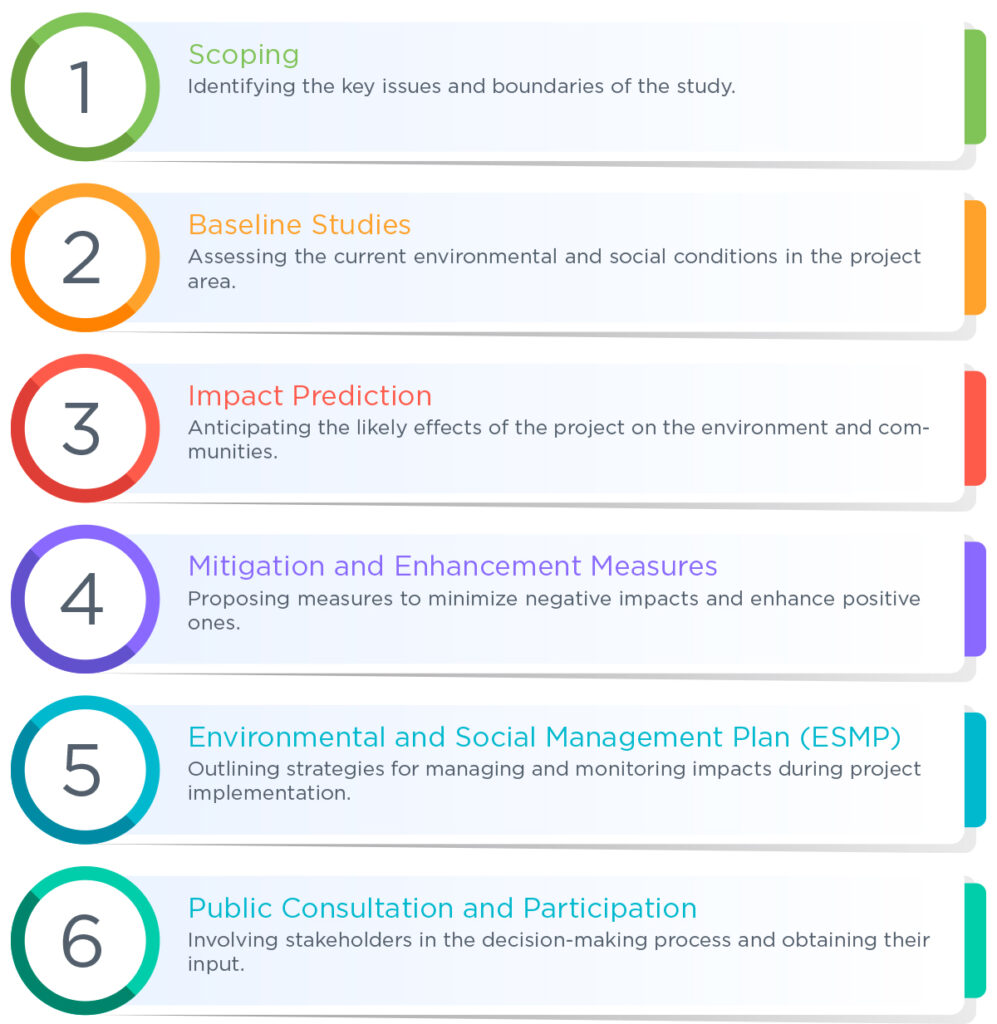Environmental Compliance
Environmental Impact Assessment
Environmental Impact Assessment (EIA) is a systematic and thorough process that evaluates the potential environmental consequences of a proposed project prior to its initiation.
It involves a structured series of steps, including scoping, baseline studies, impact prediction, and the development of mitigation measures. The primary purpose of EIA is to provide decision-makers with a comprehensive understanding of how a project may affect the environment, enabling them to make informed decisions that consider environmental sustainability and minimize adverse impacts. EIA is a proactive tool that emphasizes early intervention and responsible planning to ensure that development projects align with environmental regulations and contribute to long-term ecological balance.
By engaging GSUK’s services, your business can benefit from a comprehensive and tailored approach to environmental impact assessment, leading to well-informed decision-making, minimised environmental risks, and the establishment of a positive environmental and social legacy for your projects.

Environmental and Social Impact Assessment (ESIA)
Environmental and Social Impact Assessment (ESIA) is a systematic process that evaluates the potential environmental and social effects of a proposed project or development before it is undertaken. The primary purpose of ESIA is to identify, predict, and assess the potential positive and negative impacts of a project on the environment and local communities. This assessment helps in making informed decisions, mitigating adverse effects, and promoting sustainable development.
Here are the key components of an ESIA:

GSUK possesses the expertise to provide valuable support throughout the ESIA process. With a team of seasoned professionals, GSUK can offer guidance, conduct necessary studies, and implement advanced technologies and tools to streamline the assessment process. From data collection and analysis to regulatory compliance and stakeholder engagement, GSUK’s assistance ensures that businesses navigate the complex landscape of environmental and social impact assessments effectively. By leveraging GSUK’s resources, a business can enhance its commitment to sustainability, meet regulatory requirements, and foster positive relationships with local communities.
Construction Environmental Management Plan (CEMP)
A Construction Environmental Management Plan (CEMP) is a strategic document designed to outline the measures, procedures, and strategies to manage and mitigate the environmental impacts associated with construction projects.
The CEMP is tailored to the specific needs of each project and is developed to ensure compliance with environmental regulations and standards. It typically includes detailed information on how potential environmental risks and impacts will be identified, assessed, and addressed throughout the construction process. The goal of a CEMP is to promote sustainable construction practices, minimize negative environmental effects, and enhance overall environmental performance during the construction phase.
With the support of GSUK, your business can benefit from a comprehensive and proactive approach to environmental management, promoting responsible construction practices and ensuring compliance with environmental standards.

Carbon Footprint Measurement and Reduction
Carbon footprint measurement involves assessing the total greenhouse gas emissions, typically measured in equivalent units of carbon dioxide, associated with the activities of an individual, organization, event, or product. It encompasses direct emissions from activities like energy consumption and transportation, as well as indirect emissions from the entire lifecycle of goods and services. Once measured, efforts are then made to reduce this footprint by implementing strategies and technologies that decrease greenhouse gas emissions. This reduction can be achieved through energy efficiency, transitioning to renewable energy sources, sustainable practices, and offsetting initiatives.
GSUK plays a crucial role in helping businesses measure and reduce their carbon footprint through a range of services:
Carbon Footprint Assessment: GSUK conducts a comprehensive assessment of your business operations to quantify its carbon footprint, identifying key sources of emissions and areas for improvement.
Energy Audits and Efficiency: We perform energy audits to identify opportunities for energy efficiency improvements, helping businesses reduce their reliance on carbon-intensive energy sources.
Renewable Energy Integration:The consultancy can advise on and facilitate the integration of renewable energy sources within your operations, reducing dependence on fossil fuels and minimizing carbon emissions.
Supply Chain Analysis: GSUK can analyze the carbon footprint of your supply chain, identifying high-impact areas and working with suppliers to implement sustainable practices and reduce emissions.
Sustainable Practices and Technologies: Providing guidance on adopting sustainable practices and implementing technologies that contribute to carbon reduction, such as waste reduction, sustainable transportation, and green building initiatives.
Carbon Offset Strategies: GSUK can assist in developing and implementing carbon offset strategies, including the identification and investment in projects that sequester or reduce an equivalent amount of greenhouse gases.
Monitoring and Reporting: Implementing systems for ongoing monitoring and reporting of carbon emissions to track progress, evaluate the effectiveness of initiatives, and ensure continuous improvement.
Certifications and Recognition: Assisting businesses in obtaining certifications and recognitions related to carbon reduction efforts, enhancing the company’s reputation and sustainability credentials.

Environmental Social and Governance (ESG)
In today’s rapidly changing landscape, embedding Environmental, Social, and Governance (ESG) principles into your business is essential for compliance and a powerful way to gain a competitive edge. With two decades of experience in integrating sustainability across all its pillars, we are uniquely positioned to enhance your organization’s accountability to investors, stakeholders, and the public sector.
Our comprehensive, end-to-end ESG solutions cover critical areas such as environmental performance, social responsibility, ethical conduct, and governance frameworks aligned with GRI . Our globally positioned team understands the nuances of diverse cultures and languages, enabling us to deliver tailored ESG reports for both mega projects and SMEs. Our experts are well versed with strategic drivers and enables the business to meet the requirements from CSRD, EU commission, SBTI , SASB,CBAM and other human rights standards ( ISO 26001 and ILO conventions).
Let us partner with you to transform your sustainability efforts across your value chain into a competitive advantage that drives measurable value and enhances your reputation in the marketplace.
- ESG Strategy Development: We create customized roadmaps to help you set and achieve ambitious sustainability goals.
- Compliance & Reporting: Our team ensures you stay ahead of regulations with transparent materiality frameworks and credible ESG reports that enhance stakeholder trust.
- Operational Efficiency: We optimize processes to boost resource efficiency, reduce waste, and improve energy management, delivering cost savings.
- Risk Mitigation: We identify and address ESG risks to protect your business from potential disruptions and liabilities.
- Reputation & Value Creation: Our holistic approach enhances brand reputation and builds trust with investors, customers, and partners, unlocking new opportunities.
Our tailored ESG programs deliver long-term benefits by driving sustainability performance, increasing operational resilience, and ensuring profitability. With mandatory ESG disclosures on the rise, we can help transform ESG into a catalyst for sustainable growth and business excellence.
